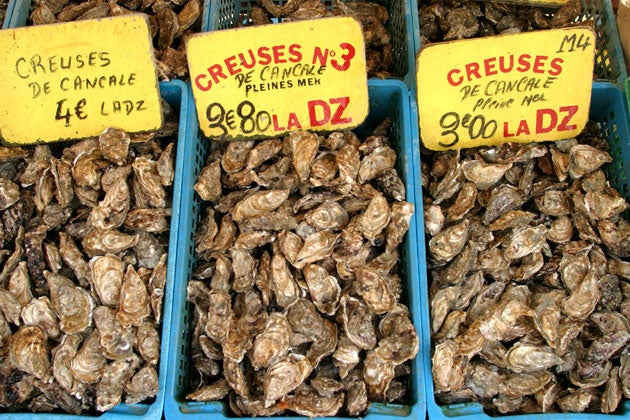Mystery plague set to wipe out France's crop of baby oysters

Your support helps us to tell the story
From reproductive rights to climate change to Big Tech, The Independent is on the ground when the story is developing. Whether it's investigating the financials of Elon Musk's pro-Trump PAC or producing our latest documentary, 'The A Word', which shines a light on the American women fighting for reproductive rights, we know how important it is to parse out the facts from the messaging.
At such a critical moment in US history, we need reporters on the ground. Your donation allows us to keep sending journalists to speak to both sides of the story.
The Independent is trusted by Americans across the entire political spectrum. And unlike many other quality news outlets, we choose not to lock Americans out of our reporting and analysis with paywalls. We believe quality journalism should be available to everyone, paid for by those who can afford it.
Your support makes all the difference.Baby oysters are dying in their millions along the French coast from Normandy to the Mediterranean, puzzling scientists and plunging France's shellfish industry into crisis.
On some parts of the Norman and Mediterranean coast, the entire one-year-old "class" of juvenile oysters, due to be eaten by Christmas 2009, has died in the space of a few days.
A number of theories have been put forward by marine biologists and oyster farmers, mostly linked to a slight rise in the temperature of the seas around western Europe this summer. Has some form of toxic algae reached French waters? If so, why are adolescent and adult oysters apparently unaffected? Are rapid changes in water temperature damaging to baby oysters? If so, why are some oyster parcs, or beds, devastated while others nearby are relatively immune?
One theory is that the warmer sea water – up to 1C higher than normal – has generated abnormal quantities of the microscopic plankton eaten by oysters. The baby shellfish, aged from 12 to 18 months, may have been dying of over-eating.
The French Agriculture and Fisheries minister, Michel Barnier, has commissioned the French Institute for Research and Exploitation of the Sea (Ifremer) to "mobilise all its resources" to identify the cause or, more likely, combination of causes. The government is expected to announce emergency aid to oyster producers to enable them to buy new oyster fry or "larva".
"The losses run to tens of millions of euros," said Joseph Costard, an oyster producer at Saint-Vaast in Normandy and president of the Norman association of shellfish producers. "We are going to have to change completely the way we do things and spread out the harvesting of the [older oysters] over two or three seasons."
Martial Monnier, director general of the national shellfish producers' body, the Comité National de la Conchyliculture, said there were fears that the mysterious ailment could spread to mature oysters. "We have a serious, serious problem," he said "There is death rate of young oysters of between 40 and 100 per cent, compared to, at worst, 30 per cent in a normal year. It is only when the next neap tides arrive that we will know whether or not the adult oysters have been affected."
The crisis is the worst to hit the French oyster industry – Europe's largest – since disease all but wiped out the native European or "Portuguese" oyster 30 years ago. Since then almost all oyster farms in Europe have been restocked with the Pacific "creuse" oyster from Japan and British Columbia. The French government and shellfish producers say the death of baby oysters should not discourage people from eating full-size oysters. Nothing remotely threatening to humans has been discovered. But the fisheries minister, M. Barnier, has asked the food safety agency, AFSSA, to investigate.
Join our commenting forum
Join thought-provoking conversations, follow other Independent readers and see their replies
Comments